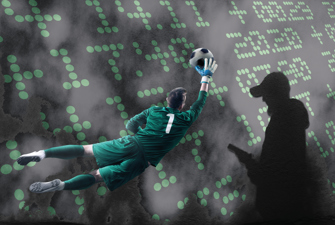Mapping the territory of football's lucrative pact with illegal sports gambling
This is the first part of a special investigation for Play the Game on the links between football and the criminal dimension of unregulated sports gambling. The article introduces the reader to the background information that is necessary to understand what goes on in the secretive world of illegal gambling that can be linked to crimes from fraud to extortion, people-trafficking, and even murder.
Manchester City, Paris Saint-Germain, Bayern Munich, Real Madrid, Milan: five of the greatest names in world football, all of them serial champions in their respective leagues, all of them part of the European super-elite which dominates international club football.
Screenshot of a Chinese advertisement for the Asian-facing illegal operator, Kaiyun, featuring players from Real Madrid FC.
But success is not the only thing they have in common. All of them have been or are partners of so-called ‘Asian-facing’ gambling companies who pay massive amounts of money to associate their brands with the players, names and history of these prestigious institutions in order to get the exposure and credibility they need to attract customers in the Far East, where advertising sports betting is prohibited in almost all jurisdictions.
All of these gambling companies, which also sponsor a multitude of other, less famous clubs throughout Europe, as well as leagues and national federations such as Belgium, Wales or Argentina, do almost all of their business in countries which outlaw and even criminalise sports gambling.
Despite that, none of the gambling companies are effectively regulated. The licences they hold – when they hold one – are by and large worthless. Their worth is in allowing operators access to the global banking system, particularly through so-called 'neo-banks' which have looser anti-money-laundering regulations.
Not even the clubs who’ve entered into commercial relationships with the gambling companies are aware of the people who ultimately control this huge industry. What is known, however, is that they are almost certainly linked to criminal organisations, notably Chinese triads.
Nonetheless, until now, football has turned a blind eye to the criminal dimension of unregulated sports gambling. Earlier investigations published in Josimar show that the vast majority of clubs do not conduct proper due diligence and fail to act when they are made aware of the true nature of the companies, they do business with. Neither do the agencies which usually act as intermediaries and set up the partnership deals.
In the absence of worldwide regulation, legislators, watchdogs, and law enforcement agencies are often powerless to put an end to the activities of these transnational bookmakers or to prevent the world’s most popular football clubs from associating with them.
As this investigation will show over several instalments, some of these actors can even be considered complicit. The investigation will reveal the scale of football’s dependency on unregulated gambling, the inner workings of this ecosystem, and highlight the reasons behind the failure – so far – of regulation to have any significant impact on the activities of these operators.
A legal provider in one country can operate illegally in another
Surprisingly, there is no universally accepted definition of what constitutes ‘illegal sports betting’. As a consequence, many national and international regulators or licensing bodies struggle to make the distinction between what should be considered 'legal' and what shouldn't be, and unregulated operators and their partners exploit this gap to the hilt.
What is usually agreed upon within the betting industry is that it is possible to divide sports betting operators into three main categories: those which are licensed and regulated; those which are licensed but not regulated; and those which are neither.
This, however, is a crude distinction. While it is clear that an unlicensed, unregulated bookmaker will, by definition, be 'illegal', what do we make of a licensed and regulated operator which is offering odds and taking bets in a country where sports gambling is illegal?
As part of the research for this series of articles, Play the Game has found examples of well-known, 'reputable' companies which have set up parallel operations targeting markets where any form of sports gambling is prohibited by law. And sponsoring sport is often central to building markets in these destinations.
Should we consider these operators 'illegal', then? There is no reason why we shouldn’t, as they are delivering a service which it is illegal to provide at the point of sale when the transaction takes place.
It is an open secret in the industry that some of the biggest brands in sports betting – brands which are advertised in football stadiums and on television, brands associated with some of the biggest clubs and leagues in the world – make a significant share of their revenue from bets placed in countries where gambling on sports events is a criminal offence. This is the case for most of China and South-East Asia, but also applies to many African and Arab countries.
Screenshot from a match between Manchester United and Liverpool in 2021. The gambling company advertised is HTH, which is owned by BOE United Technology Corporation - a service provider to the gambling industry in the Philippines that does not hold a gambling license itself
Blurred borders make regulation very difficult
Also, the existence of a regulator that grants an operator a licence does not necessarily mean that a sports betting company is regulated effectively. There are many so-called ‘regulators’ in the industry which are only too happy to take a sports betting company’s money without providing any control over what they do. This is a perfect arrangement for nefarious activity.
“You’d be better off getting a licence from a houseplant,” quipped one gambling industry insider when asked about a sports betting licence from Curaçao.
COVID-related lockdowns accelerated online gambling by 30 per cent, according to a report published in May 2022 by the Asian Racing Federation (ARF), and this astonishing growth has blurred borders to the extent that even the strictest regulators find it an overwhelming challenge to enforce local rules and legislation.
The days when betting meant putting a few banknotes on a horse at the racecourse or visiting the local bookmaker's shop to fill in a coupon are long gone. Gambling has moved to the virtual world, where tens of thousands of apps and websites offer live, in-play odds on a bewildering number of sporting events, with football very much at the forefront.
Stopping them from doing so is an onerous task. Geo-blocking which is the practice of preventing websites from being operational in certain countries is not a silver bullet, because the use of a Virtual Private Network (VPN) makes it child’s play to circumvent that restriction. Gamblers have long wised up to this.
A transnational business should require transnational regulation, but no such framework exists, not even within institutions such as the European Union.
This explains why an online operator such as 1Xbet, founded by Russian fugitives who fled prosecution for fraud and illegal gambling in their own country and now run their business from Cyprus, can be black-listed in France and Romania and, at the same time, hold a licence delivered by the Spanish Directorate General for the Regulation of Gambling through one of their subsidiaries, Wagerfair SA. The Valencia head office of Wagerfair SA is little more than a mailbox, as Play the Game found out when we visited the site.
Getting a license can be quick and cheap
The criteria which would-be operators must fulfil to obtain a licence also vary wildly from country to country, which explains why the French Agence Nationale des Jeux (ANJ) has granted a mere 17 licences to sports betting platforms as of mid-November 2023. This is exactly as many as the notorious Isle of Man-based white label provider TGP Europe has registered with the UK Gambling Commission. As of October 2023, TGP is one of 878 betting businesses licensed by the British regulator.
So-called ‘white-label’ agencies use their own licences to provide everything a betting brand needs to operate in a specific jurisdiction without exposing itself to scrutiny. This means that whilst the UK Gambling Commission will know who owns and runs TGP Europe, they will have no idea of who TGP Europe's clients ultimately are, as there is no obligation for the white-label company to disclose the identity of these clients.
Moreover, holding a licence is not the same thing as being regulated. Acquiring one in Curaçao, for example, is cheap, quick, and easy. All it takes is to approach one of four private Master Licence holders and pay for a sub-licence. Specialist agents can take care of the whole process. Due diligence ranges from superficial to non-existent.
One of the companies specialising in the acquisition of licences, curacaolicense.net, boasts that it can obtain a 'white-label' e-gaming licence within a week or two, for a cost of under 18,000 euro per annum, when licences can cost up to 25 times that in other jurisdictions.
Officially, there are 529 such active sub-licensees as of October 2023, all of whom are able to display authentic seals of approval from the Curaçao Gaming Control Board. This way they acquire legitimacy in the eyes of their partners and customers, even though they are subject to close to no scrutiny and are operating illegally in their target markets.
A clear definition of an illegal platform
The Asian Racing Federation (ARF), an association which comprises 28 national racing authorities and racing-related organisations from across Asia, Oceania, Africa and the Middle East, has come up with what is perhaps the most clearly defined characterisation of what constitutes an ‘illegal’ platform.
The ARF asks this question: “Does [this operator's] regulator licence and regulate gambling/betting offered only to persons located in that jurisdiction?” If the answer to this question is ‘no’, then the operator should be considered illegal.
This means that online platforms which operate legally in a licensed, regulated environment such as the United Kingdom are no more ‘legal’ than unregulated, unlicensed bookmakers if and when they allow gamblers to place bets on their websites from countries where sports betting is illegal, or where they do not hold a licence.
Using these criteria, the ARF identified 61 per cent of the 534 betting websites it surveyed for its 2022 report – the most thorough of its kind ever compiled about the industry – as ‘illegal’.
However, this does not prevent many of football's most prestigious institutions from engaging with euphemistically called ‘grey market’ operators and promoting them in exchange for partnership and sponsorship fees in excess of what legitimate businesses would normally offer. It is true that the amount of money circulating through this illegal gambling ecosystem is so huge as to defy belief.
The trillion-dollar market
How much the illegal sports gambling market is worth today can only be a matter of conjecture, given the opacity of an industry which is both ubiquitous in its presence on football shirts, stadium LED boards, television screens, and social networks, and secretive in the extreme when it comes to revealing who its key actors are.
However, if the very nature of the business makes it out of the question to come up with exact figures, it is possible to extrapolate from intelligence gathered in the course of prosecutions and made public in courts or from the volume of traffic registered on those websites, which can be gauged accurately with the help of open-source statistical tools.
A sizeable chunk of the illegal market operators will still evade detection, as they conduct their business via networks of agents and not through conventional apps and websites. This will encourage cryptocurrency transactions in order to add another layer of secrecy to their operations.
However, the United Nations Office on Drugs and Crime (UNODC) has come up with the astonishing figure of 1.7 trillion USD per annum in its December 2021 report on illegal betting, which is based on contributions from nearly 200 experts in that field and is the most exhaustive research conducted into the scale of this criminal activity to date.
1.7 trillion USD: this is more than three times the estimated value of the global narcotics trade and a third more than what is thought to be the value of counterfeit goods sold worldwide. No other criminal activity generates as much money as illegal gambling does.
This is a point which bears repeating again and again, as this industry benefits from a misconception that if it involves criminal activity, those crimes are by far and large victimless.
Nothing could be further from the truth. Illegal gambling goes hand in hand with fraud, extortion, tax evasion, money laundering, people trafficking, modern slavery, sexual exploitation, physical assault, torture, and even murder.
Four or five people control the market
The huge number of unregulated sports betting websites which can be accessed in a couple of clicks would suggest that this trillion-dollar business is an impenetrable chaos of small-time operations, like a market teeming with a multitude of stalls, when, in fact, the opposite is true.
Small, independent operators do exist, but they control only a negligible part of the industry, which is dominated by a handful of actors. There are perhaps as few as four or five key individuals in charge when it comes to the biggest and most lucrative of all markets in South-East Asia and the People’s Republic of China.
One single Philippines-registered company, BOE United Technology Corporation, owns the trademark for a dozen of the most visible brands which have been or still are partners of clubs such as Bayern Munich, Real Madrid, Chelsea, and Manchester United among many others.
Play the Game has found evidence that Manchester City’s Asian betting partner 8XBet is directly linked with a number of betting brands whose names are made of combinations of numbers. The most visible of these is 6686, which, like 8XBet, obtained a British licence through White Label agency TGP Europe Ltd.
Alvin Chau, the founder and chairman of Suncity Group Holdings Ltd., has been sentenced to 18 years in prison for offences linked to illegal gambling. Photo VCG /Getty Images
TGP Europe itself was set up and owned by the Macau ‘junket’ (casino group) Suncity, whose boss Alvin Chau was sentenced to 18 years in jail in January 2023 for multiple offences linked to illegal gambling. That doesn’t prevent the Isle of Man company from holding a valid British licence, through which they register .co.uk domain names for its Asian-facing partners, who can then boast that they are ‘licensed and regulated’ by the British authorities when in fact only their British iterations (most of which are non-functional) are.
Regulation is difficult even if you try
Even those regulators which actively chase unregulated, unlicensed gambling platforms with the most energy find it hard to keep pace with their targets. The French ANJ, which operates within the strictest regulatory and legal framework in Europe, has blacklisted hundreds of such sites but still cannot prevent Ligue 1 and Ligue 2 clubs from associating themselves with illegal sportsbooks – as long as these are not available or advertised to the French public.
This is how a modest club such as second-division Pau could endorse two unregulated Asian-facing bookmakers, Mansion and ONBET, in the 2022-23 season, before being reminded of its responsibilities by the ANJ. Pau complied with the agency’s advice, but other French clubs have proved impervious to pressure. AS Monaco has been a serial offender in this regard, perhaps emboldened by its unique status in French football where it is part of the French League system, yet outside of France as a self-governing principality.
The Monégasque club recently signed a new deal with 6686, one of the most blatant transgressors in the gambling industry, who, until it very recently was exposed by an investigation by Josimar, was offering free streams of every European league imaginable on its Chinese language websites. Monaco has previously worked with dubious betting brands. Before taking on 6686 as a partner, it had already signed deals with other Asian-facing betting brands such as Yabo, AYX and Kaiyun, all of which operate illegally in China and the Far East.
Despite this blatant breach of copyright, 6686 remains a partner of Lazio, Monaco and Wolverhampton Wanderers, where its name has pride of place on electronic advertising boards at every home game. It could also be seen on the hoardings of Selhurst Park stadium at a recent game between Crystal Palace and Everton.
Screenshot shows advertising for 6686bet.com at a match at Selhurst Park Stadium in London, UK.
Most of the time, the money offered by unregulated offshore betting platforms is simply too good to be turned away. Play the Game knows of a British broker who was introduced to French clubs by a sports data collection company last summer. This agent represented a new platform linked to the already-mentioned 6686, namely 5585.com, which was willing to pay half a million euro per year for nothing more than the right to describe itself as Club X or Y’s partner on its website.
But 5585.com didn’t exist yet. The partnerships it would enter into were just one of the building blocks which had to be assembled for the platform to be created. The French regulator had a quiet word with the clubs which had been approached, and 5585 was quietly shooed away. France is very much the exception in this regard, however.
All Premier League clubs have partnered with gambling brands
Research by Play the Game, which entailed trawling through club statements, press releases, betting industry newsletters and, especially, illegal Asian-facing websites, shows that at least 92 unregulated Asian-facing online gambling operators have entered into partnerships with European clubs and federations since the late 2000s.
Moreover, this number does not take into account the multiple iterations of some of these operators, such as BOB Sports, which is also known as BOB88, Bandao and BD Sport, all of which give pride of place on their internet homepage to their most famous partners, Bundesliga’s Borussia Dortmund and Serie A’s Napoli.
Many European football clubs have entered into partnerships with unregulated Asian-facing online gambling operators, and their players and logos are displayed on the operators' websites. (Screenshot)
It would be much quicker to list the clubs which haven’t taken money from unregulated betting platforms. In total, at least 86 top-flight clubs from the ‘Big Five’ European leagues have signed partnership and sponsorship deals with unregulated Asian-facing online bookmakers since the late 2000s, 33 of them from the most popular club competition in the world, the Premier League.
Every single one of the clubs which have taken part in the Premier League since 2010 have had at least one of these partners, with Leicester City holding quite an astonishing record. The Midlands club has partnered with 12 different Asian-facing gambling brands since being crowned champions of England in 2016. This record might in part be explained by the huge popularity of Leicester in South-East Asia, especially in Thailand, the home country of the Srivaddhanaprabha family which took control of the club in 2010.
In Europe, Spain is the second most popular destination for unregulated bookmakers seeking to promote their names. 18 La Liga clubs, including the ‘big three’, Real Madrid, FC Barcelona and Atlético de Madrid, have signed deals with them in the past decade, and serial Europa League winners Sevilla has also signed a deal.
La Liga clubs circumvented advertising ban
Spain is a good example of how national regulation does not prevent clubs from profiting from their association with what are de facto illegal betting operators.
La Liga, the country’s top competition, is subject to a complete gambling advertising ban on shirts and stadiums. This ban, which had been put in place on a temporary basis in March 2021, became effective on 13 August of the same year. Yet, four days later, BK8, an unregulated platform which appears to have Malaysia as its main target, announced that it had signed a partnership deal with five La Liga clubs.
BK8 did not care that its brand would be invisible in Spain, where it has no customers, as they would still be able to parade the names, colours and players of Elche, Athletic, Mallorca, Valencia and Villareal where it really mattered – on their websites, which target Chinese and South-East Asian gamblers.
Moreover, digital technology enables regional as well as international broadcasters to superimpose branded graphics on the feed they receive from the original transmission. This explains how, while watching a La Liga game, a television viewer in the Far East can be exposed to virtual gambling advertising, making it appear that the likes of BK8 are advertised in the stadium itself.
The verisimilitude of the ‘fake’ LED boards would fool most casual viewers. Once more, the transnational nature of the industry makes would-be regulators powerless in the face of a technology that has become a source of considerable income for specialist companies, the most successful of which are based in Europe.
It is striking that the London-based Interregional Sports Group (ISG), one of the leaders in this market, has also acted as a broker for some of the biggest partnership deals struck by unregulated or so-called ‘grey market’ operators with football entities.
It is through them that the Italian league Serie A signed deals with ManBetX, then Yabo, the illegal platform which was smashed by the Chinese authorities in 2021. It is also through them that 188bet, which is thought to be the ‘public face’ of the giant, unregulated Asian operator Singbet, teamed up with two of Europe’s greatest clubs, Bayern Munich and Liverpool.
Leagues do not encourage these deals, but neither do they do anything to prevent them from being signed by their clubs – and they also sign deals of their own, as Serie A and La Liga have done in the past.
Richard Master, chief executive of the Premier League (on the right), only favours slight regulation of the relationship between football clubs and betting companies. Photo: Michael Regan / Getty Images
When asked about the Spanish ban, Richard Masters, chief executive of the Premier League, commented: “The whole area does need, I think, probably, slightly firmer regulation, particularly around the most vulnerable. But I don’t necessarily think that the answer should be that clubs should no longer have betting partnerships.”
The Premier League has since then announced that its clubs would no longer be able to have the front of their shirts sponsored by betting companies from the 2026-27 season onwards, but this reform will barely have any impact, as sleeve-sponsoring, stadium advertising and regional partnerships will still be allowed.
A confusing argument used by the adversaries of blanket advertising bans was put forward by Maarten Haijer, the secretary general of the European Gaming and Betting Association:
“Advertising has a crucial role to play in informing consumers which websites are regulated, and which are not. The near absolute advertising ban proposed in Spain will deprive Spanish players of any information where they can play in a safe and secure environment.”
The argument is stunning considering that the large majority of Spanish clubs’ betting partners are neither regulated nor accessible to Spanish customers.
FIFA is also partnering with betting companies
Confederations as well as world football’s governing body, FIFA, have also refrained from reining in their sport’s dependency on money from gambling. Until very recently, FIFA's competitions were 100 per cent gambling-free, but the organisation has now gone the other way.
FIFA decided to take on a betting partner for Europe and South America during the 2022 Qatar World Cup, Betano, whose majority owner Allwyn counts International Olympic Committee member and president of World Athletics Sebastian Coe as a member of its board. Betano will also be FIFA’s official betting partner for its 2023 Club World Cup, which will take place in Saudi Arabia.
These deals were never made public by world football’s governing body. FIFA has also failed to apply the letter of its own Code of Ethics. Article 27 of this Code of Ethics expressly forbids all active football players, managers, and officials from gaining any financial benefit from entering into any association with the sports gambling industry.
Wayne Rooney and Steven Gerrard, who currently manage Birmingham City and Al Ettifaq, have not even received a warning about their endorsements of unregulated platforms Kaiyun and Yabo, of whom they are or were the most prominent individual ambassadors. Neither has Samuel Eto’o, the president of the Cameroon FA, who is paid a percentage on the bets placed by customers using his unique code on the highly controversial 1XBet platform.
It’s not just that football chooses to ignore the true nature of the industry it has signed a lucrative pact with. Football enables it to thrive.





